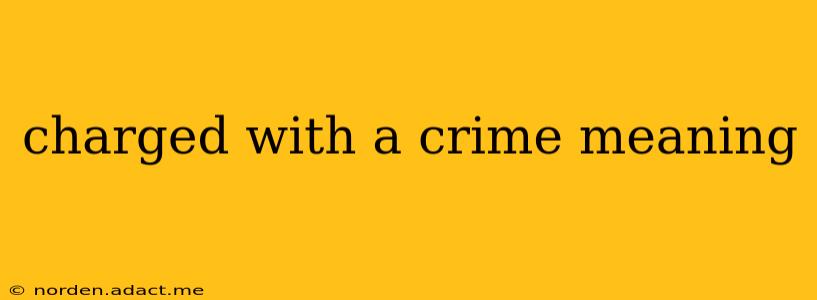Being "charged with a crime" is a serious legal matter signifying the start of a formal criminal process. It means that law enforcement authorities believe they have enough evidence to accuse you of committing a specific offense. This article will break down the meaning, implications, and common questions surrounding being charged with a crime.
What Does it Mean to be Charged with a Crime?
A criminal charge is a formal accusation by the state (or federal government) alleging that you have violated a criminal law. This isn't just an arrest; it's the official commencement of legal proceedings against you. The charge will specify the exact crime you're accused of and will be based on a probable cause determination. This means that law enforcement must present sufficient evidence to a judge or magistrate to suggest it's likely you committed the crime.
The charging process usually involves:
- Investigation: Law enforcement investigates the alleged crime, gathering evidence such as witness statements, forensic analysis, and physical evidence.
- Arrest (sometimes): While not always necessary, an arrest often precedes a formal charge.
- Filing of Charges: The prosecutor, representing the state or federal government, formally files the charges with the court. This is often done through an indictment (a formal accusation by a grand jury) or a complaint (a sworn statement by law enforcement).
- Arraignment: You'll be brought before a judge to hear the charges against you, enter a plea (guilty, not guilty, or no contest), and have your bail set (if applicable).
What Happens After You're Charged?
The legal process following a criminal charge can be complex and vary depending on the severity of the crime and the jurisdiction. However, some common steps include:
- Discovery: Both the prosecution and defense exchange evidence and information.
- Plea Bargaining: The prosecution may offer a plea bargain, allowing you to plead guilty to a lesser charge in exchange for a reduced sentence.
- Trial: If a plea agreement isn't reached, the case will proceed to trial, where a judge or jury will determine your guilt or innocence.
- Sentencing: If found guilty, the judge will impose a sentence, which could include fines, probation, community service, or imprisonment.
What are My Rights if I'm Charged with a Crime?
You have crucial legal rights if charged with a crime, including:
- The right to remain silent: You don't have to talk to law enforcement without an attorney present.
- The right to an attorney: If you can't afford one, the court will appoint a public defender.
- The right to a fair trial: This includes the right to a jury trial, to confront witnesses, and to present evidence in your defense.
- The right to due process: The legal system must follow established procedures and treat you fairly throughout the process.
What is the Difference Between Being Arrested and Being Charged?
Being arrested means law enforcement has taken you into custody. Being charged means the state or federal government has formally accused you of a crime. An arrest can occur before charges are filed, but charges are the official beginning of the criminal case.
Can Charges Be Dropped?
Yes, charges can be dropped for various reasons, including insufficient evidence, witness unavailability, prosecutorial discretion, or errors in the legal process. However, this doesn't necessarily mean the case is over; charges could be refiled later.
What Does "Felony" vs. "Misdemeanor" Mean?
Felonies are generally more serious crimes with harsher penalties (like lengthy prison sentences), while misdemeanors are less serious offenses with milder punishments (like fines or shorter jail terms).
Being charged with a crime is a serious matter requiring immediate legal counsel. This information is for educational purposes only and is not a substitute for professional legal advice. Consult with a qualified attorney to understand your rights and options if you're facing criminal charges.
